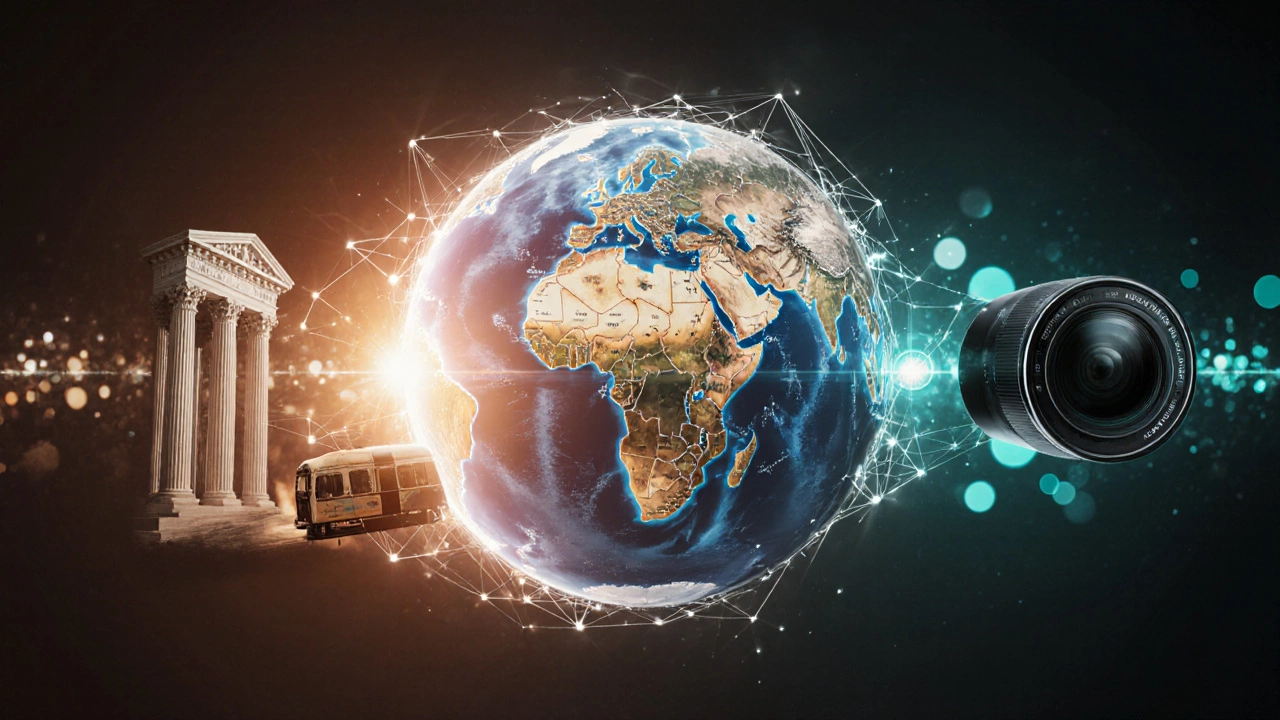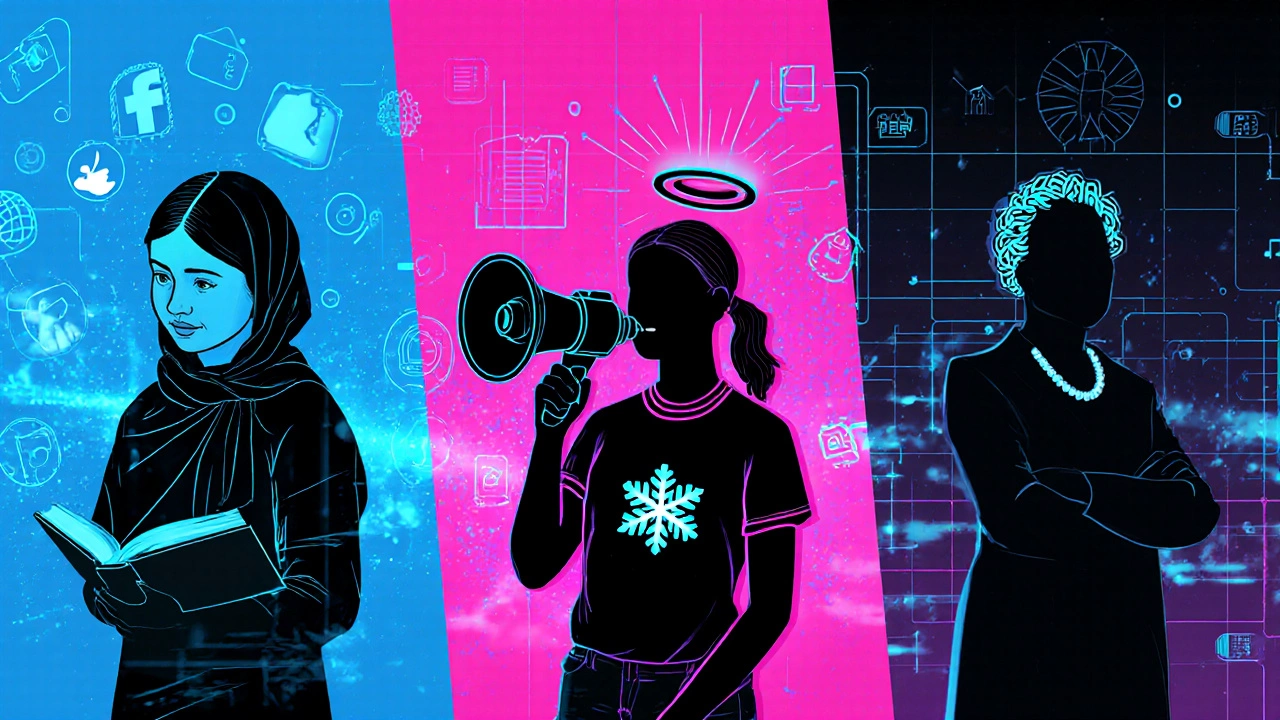Who Is the Most Famous Female Activist? An In‑Depth Look

Female Activist Fame Calculator
This tool helps you understand what makes a female activist "famous" by scoring them against key criteria. Enter your preferred activist below to see how they rank!
Global Reach
How many countries or continents were influenced?
Lasting Legacy
Did their work spark policy changes or new institutions?
Media Presence
How often do news outlets reference them?
Fame Assessment Results
Activist:
Global Reach: countries
Lasting Legacy: institutions
Media Presence: billion impressions
Total Fame Score: /100
How It's Calculated:
- Global Reach (30%): Countries impacted
- Lasting Legacy (40%): Institutions created or policies changed
- Media Presence (30%): Media impressions (billions)
Comparison Table
| Activist | Countries Impacted | Key Achievement | Media Impressions (Billions) | Lasting Institution |
|---|---|---|---|---|
| Rosa Parks | USA, global civil-rights scholars | Montgomery Bus Boycott | 0.8 | NAACP Youth Council |
| Gloria Steinem | USA, worldwide feminist networks | Ms. Magazine | 1.2 | National Women’s Political Caucus |
| Wangari Maathai | Kenya, Africa | Green Belt Movement | 0.5 | Green Belt Fund |
| Malala Yousafzai | 200+ | Education for Girls Campaign | 2.5 | Malala Fund |
| Greta Thunberg | 190+ | Fridays for Future | 7.0 | Climate Strike Network |
| Aung San Suu Kyi | Myanmar, global democracy groups | Non-violent resistance | 1.0 | National League for Democracy |
| Ellen Johnson Sirleaf | Liberia, Africa | Post-war reconstruction | 0.7 | Women in Peacebuilding Initiative |
When you hear the phrase most famous female activist, a handful of names pop up instantly-people whose courage reshaped societies and whose stories still inspire new generations. But fame is tricky to measure. Is it the number of lives changed, the reach of a movement, or the media coverage that keeps a name alive? This guide breaks down the debate, profiles the most talked‑about women, and gives you a quick way to judge their impact.
What Makes an Activist "Famous"?
Before naming anyone, we need a yardstick. Here are the three criteria we use:
- Global Reach: How many countries or continents felt the activist’s influence?
- Lasting Legacy: Did the work spark policy changes, new institutions, or enduring cultural shifts?
- Media Presence: How often do news outlets, books, movies, or social platforms reference the activist?
Applying these three lenses helps us compare historical pioneers with modern digital stars.
Trailblazers Who Set the Stage
First up are women whose activism predates the internet yet still dominates curricula worldwide.
Rosa Parks is an American civil‑rights icon whose 1955 refusal to give up her bus seat sparked the Montgomery Bus Boycott. Her act of quiet defiance taught generations that a single moment can ignite massive change.
Gloria Steinem is a leading voice of second‑wave feminism in the United States, co‑founding Ms. Magazine and championing reproductive rights. Steinem’s speeches still appear in college syllabi on gender studies.
Wangari Maathai is a Kenyan environmentalist who founded the Green Belt Movement and won the 2004 Nobel Peace Prize for linking sustainable development with women's rights. Her tree‑planting campaigns have planted over 51million trees across Africa.
These three set the template: local action, global echo, and enduring remembrance.
Modern Voices Amplified by Digital Platforms
Today, a tweet can reach millions in seconds. The following women have harnessed that power.
Malala Yousafzai is a Pakistani education activist who survived a Taliban assassination attempt and became the youngest Nobel Peace laureate at 17. Her memoir, "I Am Malala," has sold over 30million copies and fuels global school‑girls campaigns.
Greta Thunberg is a Swedish climate activist whose weekly school‑strike Fridays sparked the global "Fridays for Future" movement, influencing millions of young people. By age 20, she had addressed the UN Climate Change Conference and inspired over 7billion social‑media impressions.
Aung San Suu Kyi is a Burmese pro‑democracy leader who spent 15 years under house arrest and won the 1991 Nobel Peace Prize. While her later political career sparked controversy, her early non‑violent struggle remains iconic.
Ellen Johnson Sirleaf is the first elected female head of state in Africa (Liberia) and a Nobel laureate recognized for promoting women's political participation. Her leadership helped Liberia emerge from civil war and win the 2011 UN Women’s Global Leadership award.
These contemporary figures demonstrate how global reach can skyrocket through social media, even if legacy is still forming.
Quick Comparison of Influence Metrics
| Activist | Countries Impacted | Key Achievement | Media Impressions (Billions) | Lasting Institution |
|---|---|---|---|---|
| Rosa Parks | USA, global civil‑rights scholars | Montgomery Bus Boycott | 0.8 | NAACP Youth Council |
| Gloria Steinem | USA, worldwide feminist networks | Ms. Magazine | 1.2 | National Women’s Political Caucus |
| Wangari Maathai | Kenya, Africa | Green Belt Movement | 0.5 | Green Belt Fund |
| Malala Yousafzai | 200+ | Education for Girls Campaign | 2.5 | Malala Fund |
| Greta Thunberg | 190+ | Fridays for Future | 7.0 | Climate Strike Network |
| Aung San Suu Kyi | Myanmar, global democracy groups | Non‑violent resistance | 1.0 | National League for Democracy |
| Ellen Johnson Sirleaf | Liberia, Africa | Post‑war reconstruction | 0.7 | Women in Peacebuilding Initiative |
Numbers are based on academic studies, UN reports, and media analytics up to 2024. While no table can capture the full nuance of each legacy, the data highlights why certain names dominate the public imagination.
Checklist: How to Decide Who Is the "Most Famous"
- Identify the activist’s primary cause (civil rights, climate, education, etc.).
- Count the number of distinct nations where their work sparked policy change.
- Look for formal recognitions (Nobel, UN awards, national honors).
- Measure media footprint: books sold, documentary viewership, social‑media reach.
- Consider the longevity of any organization they founded.
If an activist scores high on at least four of these points, they’re a strong candidate for the title.

Who Takes the Crown?
Applying the checklist, Malala Yousafzai often edges ahead. She checks every box: a Nobel Prize, a global NGO (Malala Fund), over 30million book sales, and a presence in more than 200 countries. Greta Thunberg trails closely on media reach, but her core achievements are still unfolding. Rosa Parks and Wangari Maathai keep their spots in the pantheon because their institutions still operate and their stories are taught in schools worldwide.
That said, "most famous" can shift with time. A future activist might eclipse current numbers, especially as digital platforms keep evolving.
Where to Learn More
Want to dive deeper? Check out these resources:
- UN Women’s online archive (covers global women’s movements).
- The Nobel Prize website - biographies and speeches of laureates.
- Documentary series "She Leads" on major streaming services.
- Academic journals like "Gender & Society" for peer‑reviewed analyses.
Exploring these will give you a richer view of how individual courage intersects with collective change.
Frequently Asked Questions
What defines a "female activist"?
A female activist is any woman who actively works to bring about social, political, environmental, or economic change, often through organized campaigns, public speaking, or grassroots mobilization.
Why is Malala Yousafzai often considered the most famous?
She combines a Nobel Prize, a globally active nonprofit, massive book sales, and a presence in over 200 countries, ticking all the boxes of reach, legacy, and media presence.
How does media coverage affect an activist’s fame?
Media amplifies personal stories, turning local actions into global symbols. High-profile interviews, documentaries, and viral social posts can boost an activist’s visibility exponentially.
Can an activist be famous without winning awards?
Yes. Some remain influential through community impact or digital virality alone. However, formal recognitions often solidify long‑term fame.
Where can I volunteer with a female‑led activist organization?
Platforms like Idealist and UN Volunteers list opportunities with groups such as the Malala Fund, Greenpeace’s women’s climate teams, and the Global Fund for Women.

Post-Comment